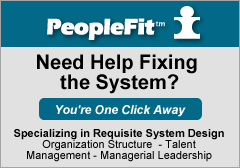Not All Work is Created Equal – Exploring Work Levels 1 through 4
By Michelle Malay Carter on January 1, 2008
I talk quite a bit about work levels so I thought I would offer a?primer on work levels 1 through 4.? The work levels model provides a universal measurement system for role complexity.? Any role, in any organization, in any industry, in any country can be categorized?by?level. Work Levels and Problem Solving Capability Should Be […]
Filed Under Executive Leadership, Organization Design, Requisite Organization, Talent Management | 10 Comments
Making the High Road Accessible – My Hope for 2008 and 2009 and 2010…
By Michelle Malay Carter on December 28, 2007
I’m feeling philosophical at year’s end – an intriguing mix of sadness and restlessness?tempered by faithfulness and hopefulness. Systematically Building Trust?through Integrated, Consistent Systems Design One of the greatest attractors I have toward Elliott Jaques’ total-systems Requisite Organization model for organization design and managerial leadership?is that it is the epitome of the high road.??I believe […]
Filed Under Corporate Values, Employee Engagement, Executive Leadership, Managerial Leadership, Organization Design, Personal Observation, Requisite Organization | Comments Off on Making the High Road Accessible – My Hope for 2008 and 2009 and 2010…
Why Disneyland is the Happiest Place on Earth
By Michelle Malay Carter on December 21, 2007
Disney has revealed its secret to being the happiest place on earth – a systems-level approach! Thanks to Bob Sutton at Work Matters?for?pointing me to?this sign generator website. Merry Christmas and Happy New Year. My posts will fall in the range of?sparse to non-existent until 2008!? Thank you to my readers and commenters for your […]
Filed Under Requisite Organization | Comments Off on Why Disneyland is the Happiest Place on Earth
Using Requisite Science to Design Work-Enabling Organizations
By Michelle Malay Carter on December 20, 2007
This post is a continuation from yesterday’s post in which I mentioned that we were able to predict the turnover of specific individuals within a client’s?organization.? I promised to tell you more on how we spot?under-utilization?today. Management Science Should Take a Page from Physical Science An analogy:? An understanding of work levels and its relationship […]
Filed Under Employee Engagement, Executive Leadership, High Potential, Managerial Leadership, Organization Design, Requisite Organization, Talent Management | 3 Comments
Predicting Turnover – It’s not Rocket Science; It’s People Science
By Michelle Malay Carter on December 19, 2007
We conducted a Talent Pool Evaluation for a client years?ago and found?four out of tweleve?of their district managers?had problem solving capability one level above?the District?Manager?role.?? Underutilized Employees Are At High Risk for Turnover? When we mentioned these particular District Managers to the client, she said these employees needed little training upon hiring and required no […]
Filed Under Employee Engagement, Executive Leadership, High Potential, Managerial Leadership, Organization Design, Requisite Organization, Talent Management | Comments Off on Predicting Turnover – It’s not Rocket Science; It’s People Science
When Everyone is Accountable, No One is Accountable – The Team Accountability Fantasy
By Michelle Malay Carter on December 16, 2007
When?a project fails, people cover their tails trying to avoid being blamed.? (This sounds like it could be the beginning of a limerick, but I digress.)? One main reason projects fail in the first place is due to the failure to assign an accountable project leader. The Slippery Slope of Egalitarianism The idea of an […]
Filed Under Accountability, Employee Engagement, Executive Leadership, Managerial Leadership, Organization Design, Requisite Organization | Comments Off on When Everyone is Accountable, No One is Accountable – The Team Accountability Fantasy
When We Lose Hope, We Cope – A Friday Serious with a Funny Ending
By Michelle Malay Carter on December 14, 2007
We all have our default coping mechanisms for dealing with stressful situations.? Some try to?dominate and intimidate.? Others accommodate and people please.? Others try to hide and withdrawal. The raw material for our “mechanism of choice”?begins with our natural hard-wiring and then we develop and refine it in a delicate dance of trial-and-error with our […]
Filed Under Corporate Values, Employee Engagement, Executive Leadership, Managerial Leadership, Organization Design, Requisite Organization, Talent Management | 2 Comments
Managerial Leadership – What Doesn’t Get Measured, Doesn’t Get Done
By Michelle Malay Carter on December 11, 2007
One of the services we offer our clients is a Leadership Scan.? We interview employees about whether basic managerial leadership practices are occurring in their department.? Further, we check to see whether?these practices are a simply a positive anomaly or whether they are specifically codified and organizationally system-supported. One of the questions we ask is:? […]
Filed Under Accountability, Corporate Values, Employee Engagement, Executive Leadership, Managerial Leadership, Organization Design, Requisite Organization | 3 Comments
Playing the Character Card Exclusively – Let’s Get a New Deck
By Michelle Malay Carter on December 9, 2007
Clemson University professor of management, Terry Leap, wrote an Article in the Wall Street Journal entitled, Keys to Spotting a Flawed CEO,?which gave a list of behaviors which should call into question a CEO’s character.? Michael McKinney’s Leading Blog featured the list of suspect behaviors,?and I, as a commenter, suggested that some of the behaviors […]
Filed Under Employee Engagement, Executive Leadership, Managerial Leadership, Organization Design, Requisite Organization, Talent Management | 2 Comments
Work, Work Everywhere, But Not a Drop of Understanding
By Michelle Malay Carter on December 6, 2007
Not all work is the same.? Would you agree?? Aren’t some roles more complex than others???Having a definition of work levels and a common language to discuss them would advance the field of management by leaps and bounds. I went to a business simulation yesterday and the crowd was loaded with human resource and organizational […]
Filed Under Executive Leadership, Managerial Leadership, Organization Design, Requisite Organization | 2 Comments
